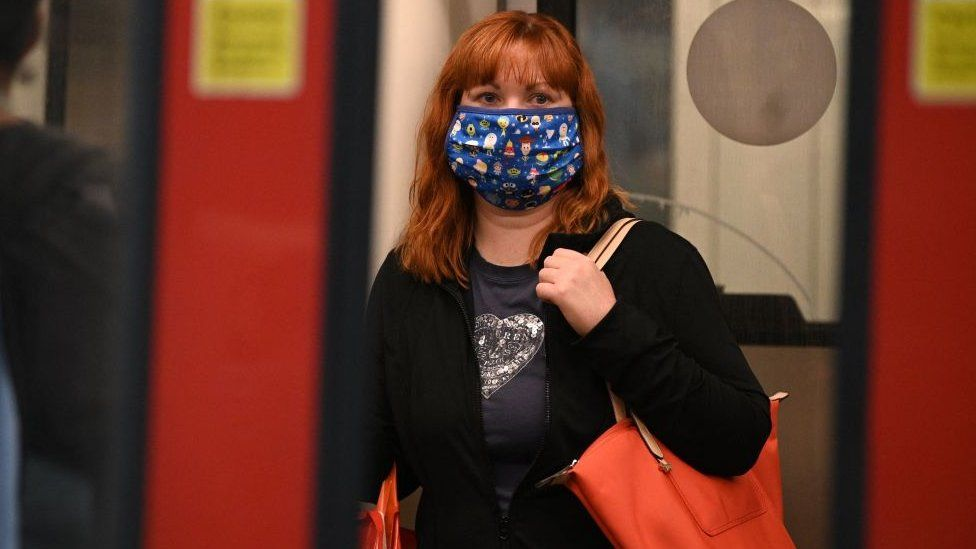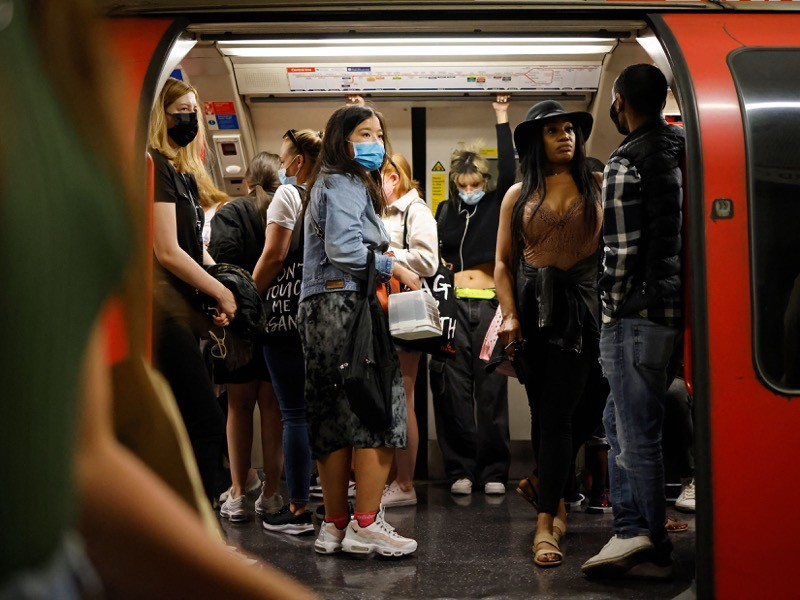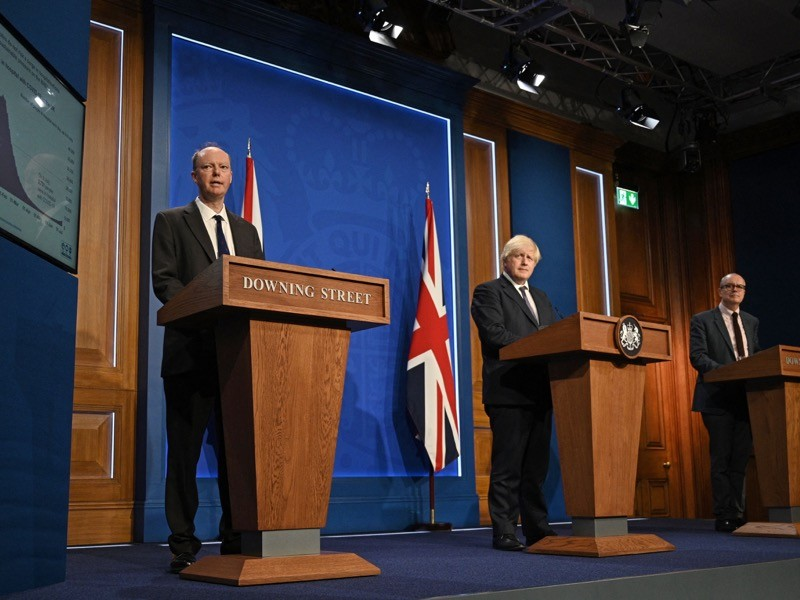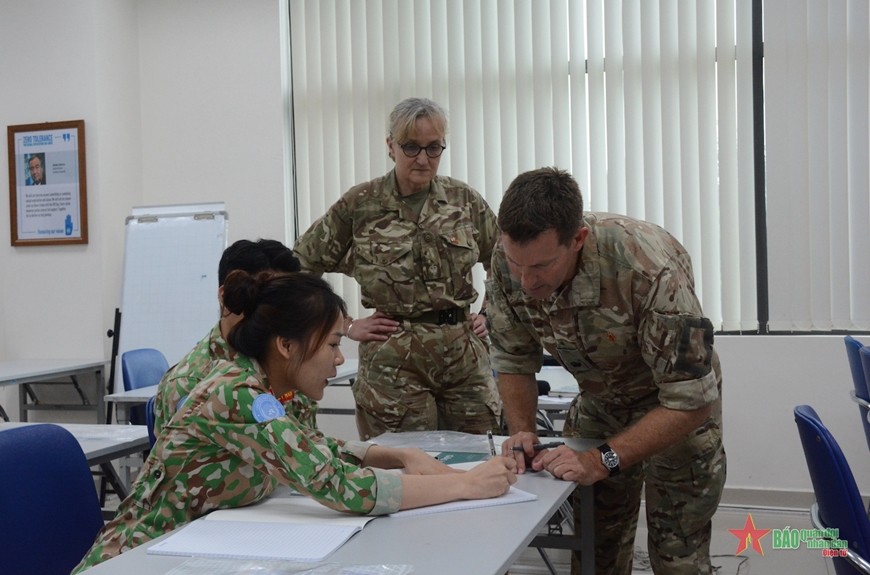Covid-19 Infected Cases Rise In England Alarmingly, Experts Say
| Covid Delta Variant Delays Dreams of Vietnamese in UK | |
| Vietnam and UK set US$10 billion trade target over next 5 years | |
| Mini Vietnam: The Spirit of a Community in Kharkov |
Latest data from swab tests in the community suggests in England, where Covid rules are due to be dropped, one in every 95 people has the virus.
That is up from one in every 160 in the previous week.
In Scotland, estimates suggest one in every 90 people is infected, while in Northern Ireland it is one in 290 and in Wales it is one in 360.
The more infectious Delta variant accounts for almost every case.
It comes as:
England's Chief Medical Officer Chris Whitty warned that Covid hospitalisations were doubling every three weeks and could hit "scary numbers" in the future
 |
| Photo: Getty Images |
Solicitor General Lucy Frazer said that while cases will rise in the coming days, there were "consequences for not opening up" as rules ease on Monday in England
Two-thirds of the public plan to keep wearing face coverings in shops and on public transport, a survey from the ONS suggested
More than half a million self-isolation alerts were sent to people using the NHS Covid-19 app in England and Wales during the first week of July - a rise of 46% on the previous week
The latest data suggests that just over 650,000 people, or 1% of the population in the UK, would test positive for coronavirus in the week to 10 July - up from 400,000 people the previous week.
The ONS says the percentage of people testing positive has "continued to increase" in England and Scotland, whereas the "trend is uncertain" in Wales and Northern Ireland.
Sarah Crofts, head of Analytical Outputs for the Covid-19 Infection Survey, said: "Infections have increased across much of the UK, with England currently at levels last seen in February this year.
Prof Whitty told an online seminar hosted by the Science Museum on Thursday evening that the situation in the UK could become very dangerous for individual hospitals.
He said: "I don't think we should underestimate the fact that we could get into trouble again surprisingly fast.
"Saying the numbers in hospital are low now, that does not mean the numbers will be low in hospital in five, six, seven, eight weeks' time.
"They could actually be really quite serious."
Ms Frazer told Sky News the government could not rule out reintroducing restrictions in England if the virus situation became "unacceptable".
England's coronavirus R number range has decreased slightly to between 1.2 and 1.4, which means that, on average, every 10 people infected will infect between 12 and 14 other people.
Last week, R was between 1.2 and 1.5.
On Thursday, the UK recorded new 48,553 new infections and a further 63 deaths within 28 days of a positive test.
Delta virus variant cases rose by 17% in the latest week, with a further 36,800 recorded, Public Health England (PHE) said.
England’s COVID ‘freedom day’ alarms researchers
 |
| A crowded train on the London Underground in June.Credit: Tolga Akmen/AFP/Getty |
In less than a week, the UK government plans to drop nearly all measures for mitigating the spread of COVID–19 across England — despite steeply rising infections in the partially vaccinated population. The decision, widely hailed by its advocates as heralding a ‘freedom day’, has been sharply criticized by many scientific and public-health experts in the United Kingdom and beyond.
Some scientists call the relaxation an unprecedented public-health experiment that could result in large numbers of hospitalizations and deaths, and increase the chances of vaccine-resistant variants of SARS-CoV-2 emerging.
“There is absolutely no justification for relaxing restrictions now,” says Peter English, former chair of the British Medical Association’s Public Health Medicine Committee. “If anything, they should be tightened, at least until the increase in case rates has reversed.”
Researchers worldwide are concerned in particular because of the potential for high infection rates in a partially vaccinated population to breed further concerning variants that could then be exported around the world. “The world has its eyes on the UK,” says Lauren Ancel Meyers, director of the University of Texas at Austin’s COVID-19 Modeling Consortium.
“The decision, and the way it has been presented, repeats a pattern of foolishly promising an outcome when dealing with a highly infectious agent,” says epidemiologist William Hanage, at the Harvard T. H. Chan School of Public Health in Boston, Massachusetts, alluding to the government's earlier, premature assurances that the pandemic would soon be over.
A dangerous experiment
 |
| Chris Whitty, chief medical adviser to the UK government, in a 12 July press conference with Prime Minister Boris Johnson (centre) and chief scientific adviser Patrick Vallance (right).Credit: Daniel Leal-Olivas/AFP/Getty |
In late February, UK Prime Minister Boris Johnson announced a four-step road map that would take England from full lockdown to an ending of all restrictions on 21 June. That schedule was delayed for a month because of the spread of the more-infectious Delta variant of the virus.
The government said that relaxation of restrictions would be guided by “data, not dates”, and that each stage of the opening up would happen only if certain criteria were satisfied. In particular, reopening would be postponed or reviewed if a rise in infection rates risked causing a surge in hospital admissions, or if new variants of the virus altered the picture. It is unclear whether those measures have been met for the reopening in July, say researchers. On 11 July, there were 31,000 recorded new cases of COVID-19 — total infections are now around 300 per 100,000 people. And a new modelling study shows an impending surge of hospitalizations, although the exact numbers are highly uncertain.
The government argues that, nonetheless, relaxation is justified — given the damage to the economy, livelihoods, education and mental health caused by restrictions — because the country’s good progress on vaccinations has weakened the link between infections and hospitalizations or deaths. As of early July, around 68% of the population had received at least one shot of a vaccine, and 52% had received two doses. Although current infections are comparable to the situation in February, hospitalizations and deaths are more than ten times lower.
The government has decided that this is an acceptable compromise, but many scientists and health professionals have grave doubts. “Even with lower hospitalization and fatality rates, current trends in the UK are likely to strain healthcare systems and lead to substantial public health consequences,” says Meyers. On 7 July, The Lancet published a letter1 with around 100 signatories from the United Kingdom and beyond, accusing the UK government of “embarking on a dangerous and unethical experiment”.
Some are concerned that the government is willing to accept widespread infections among young people and children, who are not vaccinated and currently make up most of the known cases. Although this group is at far lower risk of serious illness and death than are older people, public-health specialists say that a policy that encourages the spread of infectious disease is unprecedented. Some think that the government is aiming to achieve ‘herd immunity’ in the population through a mix of natural infection and vaccination.
 | How to watch England vs Ukraine: TV channels, live stream, online Ukraine and England will face off each other in July 3, and will be held at Stadio Olimpico in Rome. Here is how to watch ... |
 | Russian President Vladimir Putin: US and UK are involved in Black Sea "provocation" On Wednesday, Russian President Vladimir Putin said that an incident involving a British destroyer in the Black Sea couldn’t have triggered a global conflict, indicating ... |
 | "Phuket sandbox" plan becomes hope for Thailand to save tourism Thailand will soon welcome international tourists who are vaccinated to the famous resort island of Phuket without having to go through 14-day quarantine, in hope ... |
Recommended
 World
World
Pakistan NCRC report explores emerging child rights issues
 World
World
"India has right to defend herself against terror," says German Foreign Minister, endorses Op Sindoor
 World
World
‘We stand with India’: Japan, UAE back New Delhi over its global outreach against terror
 World
World
'Action Was Entirely Justifiable': Former US NSA John Bolton Backs India's Right After Pahalgam Attack
 World
World
US, China Conclude Trade Talks with Positive Outcome
 World
World
Nifty, Sensex jumped more than 2% in opening as India-Pakistan tensions ease
 World
World
Easing of US-China Tariffs: Markets React Positively, Experts Remain Cautious
 World
World





